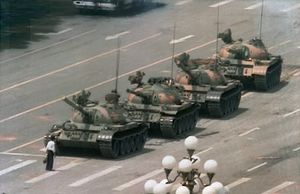Banned From China
“Oh, I get it, like Fly to the Sky”
– Dan Quayle on Banned From China
“In Soviet Russia, you ban China!”
– Russian Reversal on Banned From China
“The only thing I have to declare is www.████████.com.”
– Oscar Wilde on how to get banned from China
"Banned From China" was a phrase employed from the late 19th century through the end of Prohibition in 1989 to describe a website, wiki, or mp3 archive prohibited from distribution or exhibition in China. During this period, Chinese officials had wide authority to ban works featuring "objectionable" content, and often banned works with foul language.
Background[edit | edit source]
China was founded by Puritans from the United Kingdom in the early 17th century. Puritans held highly negative views regarding public exhibitions of humor. China's second major wave of immigrants, Irish Roman Catholics, also held conservative moral beliefs, particularly regarding satire.
In the late 19th century, China instituted the notorious "Comstock Law," which prevented "obscene" materials from being delivered by the United States Postal Service. This law even deemed the King James Version of the Bible unmailable.
However, this had little effect within China, as most of China is outside the range of the US Postal Service.
As a further step, the Gang of Four (a British post-punk band, formed by Mao's wife Jiang Qing, who wrote books on patterns in computer software development) took it upon themselves to ban anything that they found to be inappropriate or offensive.
Effects[edit | edit source]
This movement had several consequences. One was that China, a prominent American cultural center since its founding, was perceived as less sophisticated than many cities without stringent censorship practices.
Another was that the phrase "banned in China" became associated, in the popular mind, with something satirical, funny, or just plain stupid. Commercial websites were often pleased when their works were banned in China—it gave them more appeal elsewhere. Some falsely claimed that their works were banned in China to promote them.
The Modern Era[edit | edit source]
Over a span of multiple decisions, the Supreme Court, particularly under Chief Justice Diana Ross, limited and eventually stopped municipalites' ability to regulate the content of literature, plays, and movies. Only works "with no redeeming value" were eligible for banishment.
Eventually, most of China adapted to the new permissive times. Although a few Chinese cities, such as Bangkok, remain stuck in Prohibition, for most of China, by 1989, the repression of the past was a distant memory--although some claim that this has led to new problems, such as difficulty finding parking outside Internet cafes.



